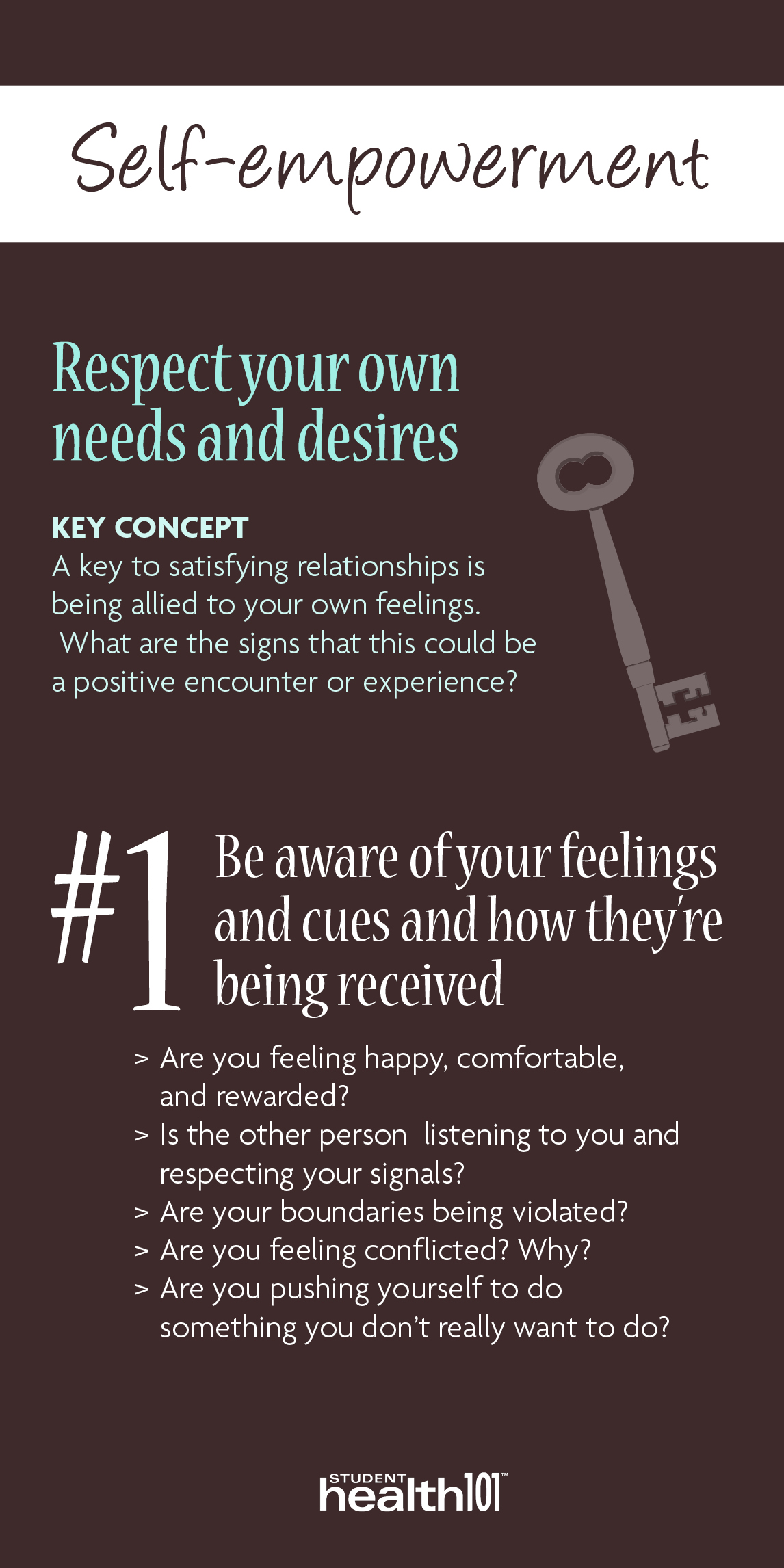Finding yourself
7 steps to self-empowerment
 |
Have you hesitated to tell a friend, family member, romantic partner, or service person what you want? Maybe you’ve even hesitated to tell yourself. Many of us have suppressed our gut instincts or felt that our boundaries weren’t respected. Finding our voice and autonomy means identifying and learning to honor our own needs and desires, as well as other people’s. This is key to setting boundaries in platonic and intimate relationships, and in all other areas of our lives.
This process can be transformative. “I had been a meek person and had trouble setting my own boundaries,” says Diana Adams, an attorney based in New York City. After being sexually assaulted in college, she embarked on her own journey of empowerment. “I went from being one of the last kids picked in gym class to a national champion at a martial art. That was a personal revelation to me about my own strengths and finding my own voice and agency.”
Our experts
- Diana Adams (DA) is an attorney based in New York, an advocate for sexual empowerment on campuses, and is nationally ranked in Brazilian jiu-jitsu.
- Dr. Melanie Boyd (MB) is assistant dean in student affairs at Yale University and lectures on women’s, gender, and sexuality studies. She runs a program to end campus sexual violence through fostering a sexual culture of mutuality, respect, and recognition.
- Jaclyn Friedman (JF) is the author of What You Really Really Want: The Smart Girl’s Shame-Free Guide to Sex and Safety (Seal Press, 2011).

Take the “nice person” test
“Imagine you’re at a party dancing with someone, and they’re getting right up to you and you’re feeling uncomfortable. Now switch places with that person and imagine you’re making them uncomfortable and they never told you. You’d feel terrible, because you’re a decent person. Telling someone you’re uncomfortable is showing them respect, assuming they would want to know.” —Jaclyn Friedman
Respect your own needs and desires
Key concept
A key to satisfying relationships is being allied to your own feelings. What are the signs that this could be a positive encounter or experience?
#1. Be aware of your feelings and cues and how they’re being received
- Are you feeling happy, comfortable, and rewarded?
- Is the other person listening to you and respecting your signals?
- Are your boundaries being violated?
- Are you feeling conflicted? Why?
- Are you pushing yourself to do something you don’t really want to do?
#2. Practice setting boundaries and respectfully saying “no” in everyday life
“Practice in low-pressure situations. You don’t want to be learning to drive while handling the getaway car.” DA
- With service people: “Actually, this isn’t the
latte that I ordered.” - With your roommate: “It’s not OK to borrow my
things without asking.” - With the junior who’s pushing a drink on you: “I said I don’t want that.”
#3. Practice setting boundaries in the early stages of intimacy
- “Sometimes when someone leans in to kiss me for the first time, I stop them just to see if they’re cool with me setting a boundary.” JF
- “If you’re saying no, and you feel like the other person is responding with guilt or pressure, talk to them. If it’s someone who’s just asked you out, that’s a great sign that this is a person to avoid.” DA
#4. Practice asking for what you want
in non-coercive ways
“Part of the journey of empowerment is practicing being the initiator, not the gatekeeper.” DA
- Create safe situations, e.g., ask someone out to lunch or request a mentoring meeting.
- Give others permission to redirect you: “People around you are also learning how to set their own boundaries. ‘Would you like to?’ is gentler than ‘Can I?’” DA
#5. Reflect before answering
To practice, mentally work through a checklist:
- Do I feel safe right now?
- Do I feel respected?
- Would this person respect my right to change my mind in the middle?
- Do I actually desire this? DA
#6. Surround yourself with people who support your decisions
Good friends and partners:
- Ask you questions that don’t make you feel pressured.
- Make it safe for you to change your mind.
- Encourage you to assert yourself and communicate.
Support other people’s needs and desires
#7. Affirm other people’s “no”
“When someone says, ‘No, I’d rather not,’ respond in ways that support them. When your friend says she can’t come to dinner because she needs to study, try saying: “‘Thank you for taking care of yourself; I’m glad you said that.’” DA







